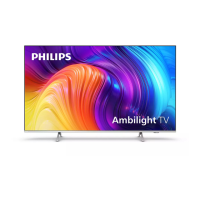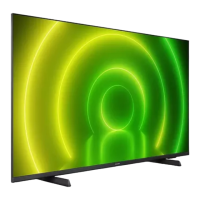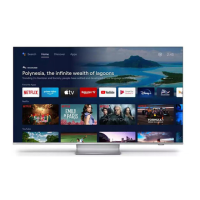Do you have a question about the Philips 50PUG7625 and is the answer not in the manual?
How to find and register your TV's model and serial numbers for support.
Accessing built-in help, how-to guides, and user manual features on the TV.
Using Philips' online support for troubleshooting, FAQs, software, and manuals.
Contacting consumer care for support and repair services, finding contact information.
Instructions for updating TV software via Internet or USB for optimal performance.
Enabling automatic software updates for the TV to ensure it's always up-to-date.
Overview of the remote control buttons, battery replacement, and cleaning instructions.
Using the TV's built-in joystick for basic operations when the remote is unavailable.
Emphasizes reading safety instructions before operating the TV for safe usage.
Guidelines for optimal TV placement, including distance from walls and screen height.
Instructions on connecting the power cable and turning the TV on for the first time.
Advice on connecting devices with the highest quality connection for optimal picture and sound.
How to connect an antenna to the TV for receiving broadcast signals.
Connecting devices via HDMI for best picture and sound quality, including HDR support.
Using HDMI ARC for audio return channel to send TV sound to an HTS.
How to mirror your mobile device screen to the TV for sharing content.
Connecting headphones to the TV for private listening.
Viewing photos, videos, and music from a USB flash drive connected to the TV.
Pairing and managing Bluetooth devices like speakers and headphones for audio output.
How to open and navigate the source menu to select connected devices.
Customizing names and icons for connected input sources.
How to watch TV channels, use the channel list, and understand channel icons.
Steps for installing channels via antenna/cable, including search and reinstallation options.
Accessing options like program info, audio language, and closed caption settings.
How to open and manage channel lists, including options for filtering and sorting.
Creating personalized lists of favorite channels for quick access.
Displaying closed captions at all times or only when the TV is muted.
Selecting preferred audio languages for TV broadcasts.
Changing the language of the TV's menus and messages.
Specific feature for Brazil, allowing control of Ginga settings.
Understanding how to view TV program schedules and guide information.
Navigating the TV guide, tuning to programs, and viewing program details.
Viewing photos, videos, and music from a USB flash drive or hard drive.
Accessing media files from a computer or Network Attached Storage.
Options for viewing photos, including slideshows and thumbnail views.
Playing video files from connected storage devices, with playback controls.
Playing music files from connected storage devices, with playback controls.
Navigating the main Home menu and its different sections.
Accessing frequently used settings and the comprehensive 'All settings' menu.
Adjusting picture quality settings like style, color, contrast, and sharpness.
Selecting preset sound styles for optimal audio experience based on content.
Configuring USB keyboard and mouse settings for enhanced interaction.
Optimizing HDMI connection for Ultra HD signals and compatibility.
Adjusting energy saving levels for reduced power consumption.
Turning off the TV screen to save energy while audio continues.
Setting timers for automatic TV switch-off to conserve energy.
Selecting TV location mode (Home/Shop) to optimize settings.
Configuring region and language settings, including clock and menu language.
Setting up child lock codes and age ratings to restrict content access.
Connecting the TV to a home network for internet access and Smart TV features.
Steps for connecting the TV wirelessly or via a wired Ethernet cable.
Viewing network settings, configuring IP addresses, and managing Wi-Fi connections.
Initial setup process for Smart TV features, including terms and conditions.
Accessing and navigating the Smart TV start page, apps, and internet features.
Browsing and searching for apps and websites within the TV's app gallery.
Information about the TV's energy efficiency class and consumption.
Guidelines for proper disposal of old products and batteries for environmental safety.
Details on screen sizes and native display resolution of the TV.
List of computer input resolutions supported by the TV via HDMI.
Various sound features including Dolby Atmos, Clear Dialogue, and A.I. Sound.
Supported connections, playback formats, and media server software for multimedia.
List of input/output ports located on the TV sides and bottom.
General troubleshooting tips and resources for resolving TV issues.
Steps to troubleshoot when the TV does not switch on.
Troubleshooting steps for when the TV does not respond to the remote control.
Troubleshooting issues related to finding or displaying digital channels.
Troubleshooting common picture issues like no picture, distorted picture, or poor reception.
Troubleshooting sound issues like no sound, poor sound quality, or loud noise.
Troubleshooting HDMI connections and Ultra HD signal compatibility issues.
Troubleshooting issues with USB devices not showing content or choppy playback.
Troubleshooting Wi-Fi, network, and internet connectivity problems.
Steps to change the menu language back to the correct one.
Important safety instructions to prevent electric shock, fire, and damage.
Instructions for safely cleaning the TV screen and frame without damage.
Trademark information for HDMI technology and its logo.
Trademark and licensing information for Dolby Audio technology.
Trademark and licensing information for Dolby Vision and Atmos.
General statement about other registered and unregistered trademarks.
Information about open source software used in the TV and how to obtain source code.
Details about open source licenses (GPL, LGPL) and terms of use for the software.
| Display Technology | LED |
|---|---|
| HDR | Yes |
| Smart TV | Yes |
| Operating System | Android TV |
| Refresh Rate | 60 Hz |
| Storage | 16 GB |
| Wi-Fi | Yes |
| Bluetooth | Yes |
| HDMI Ports | 3 |
| USB Ports | 2 |
| Number of speakers | 2 |
| Audio Output | 20 W |
| RMS rated power | 20 W |
| Screen shape | Flat |
| Aspect ratio | 16:9 |
| VESA mounting | Yes |
| VESA mounting interfaces | 200 x 200 mm |
| Screen Size | 50 inches |
| Resolution | 3840 x 2160 pixels |
| HD type | 4K Ultra HD |
| Operating system installed | Android TV |
| Processor | Quad-core |











